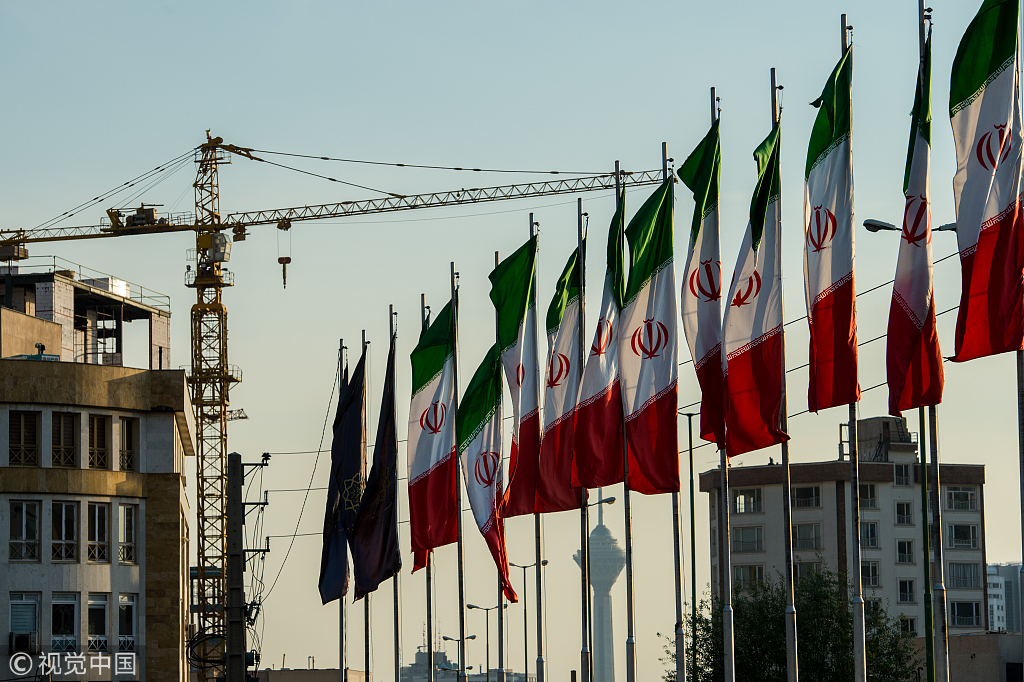Iran-US relations deteriorate after 'terrorist' labeling of state organizations
- By Sajjad Malik
 0 Comment(s)
0 Comment(s) Print
Print E-mail China.org.cn, April 17, 2019
E-mail China.org.cn, April 17, 2019

U.S. President Donald Trump, in an unprecedented move, has declared the Revolutionary Guards of Iran a "terrorist" organization. It is the first time a state security agency has been targeted in such a way by the United States.
This decision took effect on April 15, which means that the elite forces of Iran and its members are now subject to economic sanctions.
Officially known as the Islamic Revolutionary Guards Corps (IRGC) – shortened to "Pasdaran" in Persian – it was created after the Islamic revolution in 1979, and tasked to safeguard the revolution and the key personalities associated with it.
The IRGC is controlled by Iran's supreme leader and the actual fighting force comprises over 100,000 personnel. However, there are others who are linked to it either through training or ideology and can come to its aid in case of any emergency.
Both Iran and U.S. portray the IRGC as one big force. There were reports that about 11 million Iranians, who are directly and indirectly part of this force, might be affected by the U.S. decision.
However, it may be quite hard to know the exact impact of the sanctions as Iran is unlikely to reveal that its premier force is suffering due to U.S. imposed restrictions.
Apparently, the IRCG is different from the army, which controls the borders of the country. Instead, the IRCG has overlapping roles. The Pasdaran's main job is to ensure the longevity of the Islamic revolution and protect it from any threats by domestic deviant elements. But it also cooperates with the army on the external front to protect the revolution from external threats. For example, the IRCG has active naval detachments in the Persian Gulf to defend the interests of Iran.
The IRGC took part in the war with Iraq that broke out soon after the revolution. Lately, its members have also been active in Syria against the opponents of Bashar al-Assad. Their involvement in Syria and also in Iraq after the removal of Saddam Hussein has increased the regional outreach of the Revolutionary Guards.
Regional rivals, Saudi Arabia and Bahrain, had already designated the IRGC a "terrorist" organization. Their position was strengthened by the U.S., which joined them by extending the same treatment to this group.
The U.S. decision is strategic as well as political. It not only satisfies Saudi Arabia but also its long term protégé Israel. Soon after the announcement of the decision, Israeli Prime Minister Benjamin Netanyahu tweeted that this was indeed the fulfillment of a request he had made.
The U.S. had already blacklisted dozens of individuals and entities linked with the IRGC, but this is the first time that the entire force is being targeted. The decision will, undoubtedly, have major security implications for the region.
Iran had previously warned the U.S. that it would retaliate and soon followed up by designating the U.S. Central Command (CENTCOM) a terrorist organization. This organization is responsible for actions to protect American interests as well as its allies in the Middle East and adjoining areas including Afghanistan and Pakistan.
The IRGC claims that CENTCOM bases and aircraft carriers are within striking range of its missiles. It also threatened to disrupt oil supplies in case of war.
This designation has dimmed the chances, if any, of constructive engagement between Iran and U.S. Their bilateral tensions will keep the region simmering with unrest when it badly needs peace and stability.
Despite the security implications, the decision may not have any deep impact on Iran's domestic politics in the near future. The main reason is that Iran has already been burdened with U.S. sanctions, which were re-introduced after the U.S. pulled out of the nuclear deal.
Some of these sanctions have been in place for decades but they have failed to force Iran to change in any way. They have failed to completely cripple Iran's economy and the nation has only since grown more defiant.
No doubt, there are hardships and an economic price which the country and its people are facing but the actual victims are the poor and vulnerable groups.
There are occasional disturbances and people take to the streets in protest. But the IRGC or its affiliate, the Basij paramilitary force, often spring into action and suppress the protests. So far, there have been no major uprisings, as Iran has showed its resilience and determination to confront the U.S. and its regional rivals.
The lesson learnt here is that unilateral sanctions always do not produce the intended consequences and results.
Sajjad Malik is a columnist with China.org.cn. For more information please visit:
http://www.china.org.cn/opinion/SajjadMalik.htm
Opinion articles reflect the views of their authors, not necessarily those of China.org.cn.
If you would like to contribute, please contact us at opinion@china.org.cn.






Go to Forum >>0 Comment(s)